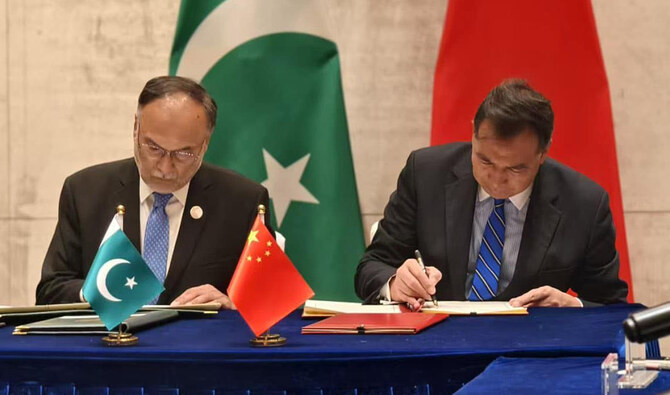ISLAMABAD: Islamabad and Beijing have signed a climate cooperation agreement to implement an information and early warning system in Pakistan with the aim to strengthen the South Asian nation’s resilience against climate-related disasters, state media reported on Tuesday.
The Climate Information and Early Warning System Project, which is being implemented by the Pakistani ministry of climate change and the United Nations Development Program, began in February 2023 and aims to install early warning systems as well as carry out capacity building, community engagement and sustainable livelihood support projects, particularly in the northern regions of the country vulnerable to Glacial Lake Outburst Floods (GLOFs). GLOFs can occur when a glacial lake’s moraine dam rapidly accumulates water and bursts. The resulting release of water and debris can cause catastrophic destruction to downstream areas.
Pakistani Planning and Development Minister Ahsan Iqbal is visiting China to attend the 3rd China-Indian Ocean Region Forum on Blue Economy Cooperation from Dec. 15-17, a dialogue Beijing says is aimed at connecting governments, financial institutions and businesses to promote regional integration in the development of the blue economy.
During his visit, Iqbal held a meeting on Tuesday with the director of the China International Development Cooperation Agency (CIDCA), Luo Zhaohui in Kunming.
“Following the meeting Zhaohui and Iqbal signed cooperation documents including those related to the implementation of Pakistan’s Climate Information and Early Warning System Project,” the Associated Press of Pakistan (APP) said on Tuesday.
APP quoted Luo as saying CIDCA was committed to working with Pakistan to implement the climate agreements, actively promote the joint construction of Belt and Road Initiative (BRI) projects, implement the Global Development Initiative (GDI), and deepen China-Pakistan development cooperation in general.
“CIDCA is committed to supporting Pakistan’s post-flood reconstruction and rehabilitation efforts, solidifying the enduring partnership between the two nations,” state media said, quoting Luo.
According to the Global Climate Risk Index, Pakistan is the fifth most vulnerable country to climate change, annually facing extreme weather events like floods, droughts and heatwaves that significantly affect agriculture, infrastructure and livelihoods.
In 2022, unusually heavy rains triggered floods in many parts of Pakistan, killing over 1,700 people, inflicting economic losses of around $30 billion, and affecting at least 30 million people.
















